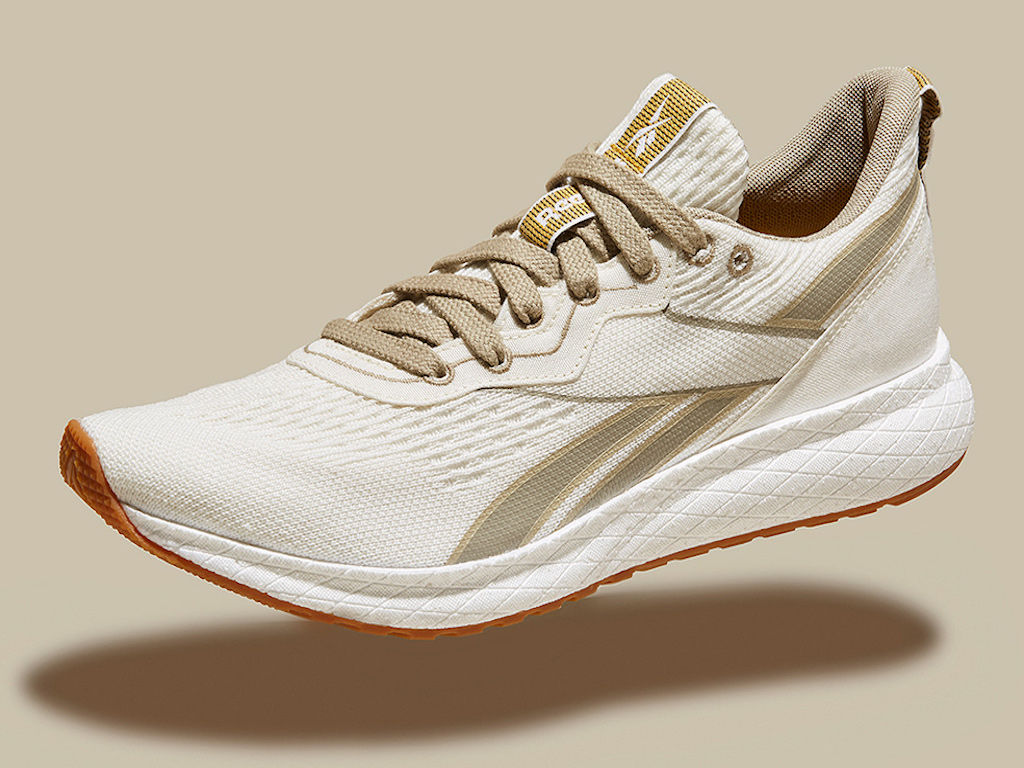3 Mins Read
Reebok, the global sports footwear and apparel brand, has just announced their brand new sustainable plant-based performance running shoe. Named the Forever Floatride GROW, the running shoe made with castor beans, algae foam, natural rubber and eucalyptus will be commercially available in Autumn 2020. Containing no petroleum-based plastics at all, the product is a step up from the brand’s previous foray with corn and cotton materials and a bid to improve the eco-friendliness of their collection. The new show is part of a wider trend across the apparel industry, from mainstream labels to independent boutiques, of approaching design with sustainability in mind to rein in the environmentally-conscious consumer market.
Reebok, a subsidiary of the global sporting goods giant Adidas, has just made public the launch of their Forever Floatride GROW shoe, the brand’s first completely plant-based performance running shoe. The latest initiative to abandon petroleum plastics altogether, the vegan-friendly shoe is made out of 100% natural plant materials. The sustainably-sourced eucalyptus tree is used to build the upper part, castor beans for the cushioned midsole, the outsole is created with natural rubber, and the odour-resistant sock liner is made from algae foam harvested from invasive growth areas.
This is an updated version of their popular Forever Floatride Energy sneakers while maintaining the high performance and lightweight that durable and supportive running shoes required. Already causing a storm amongst the eco-conscious, shoppers can pen down Autumn next year for the commercial release of the shoes.
Speaking on the launch, Reebok brand president said: “The earth is a runner’s arena, and we have a responsibility to help detox the world for the athletes who run in it,” adding that this will be the “most sustainable performance running shoe on the market.”
Reducing the content of petroleum-based plastics is a crucial aspect of making products more sustainable. While it may come as a surprise, many of our clothes and shoes contain plastics made from oil. According to a Common Objective report, 60% of the world’s garments and shoes are manufactured with oil, which then gets turned into fabrics like polyester and nylon and synthetic rubber materials for shoes and linings. This process not only generates significant carbon emissions but also contributes to water waste, contamination and air pollution.
This is not the brand’s first time experimenting with plant-based materials. Last year, Reebok debuted its Cotton + Corn lifestyle footwear collection as a part of its company-wide sustainability initiative. The vegan collection quickly gained traction in the sustainable fashion world as the only sneakers on the market that was USDA-certified as containing at least 75% biobased content and sold in 100% recyclable packaging. Other green campaigns from Reebok include pledging to eliminate virgin polyester from its material mix by 2024.
According to Reebok’s vice president Bill McInnis, the new GROW version of the Forever Floatride, which replaces oil-based plastic entirely with plants, took three years to develop. “The biggest challenge in making a shoe like this was developing plant-based materials that could meet high-performance needs of runners…with no compromise,” McInnis said.
More and more brands, both mainstream and boutique, are prioritising the sustainability of designs in order to continue attracting mainly young consumers who have growing concerns about their environmental footprint, and are now buying sustainable products more than ever before. Not only are independent startups like Isle of Wight-based Wyatt & Jack upcycling bouncy castles and London brand Vollebak creating biodegradable t-shirts out of algae, but major fashion labels are also catching on too albeit with milder sustainability commitments. ZARA, for instance, has pledged to phase out virgin synthetics, while H&M has launched a new rental, repair and recycling service.
Lead image courtesy of Reebok.




